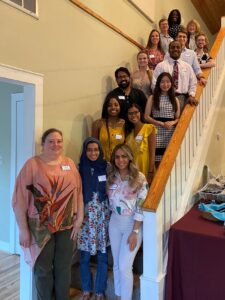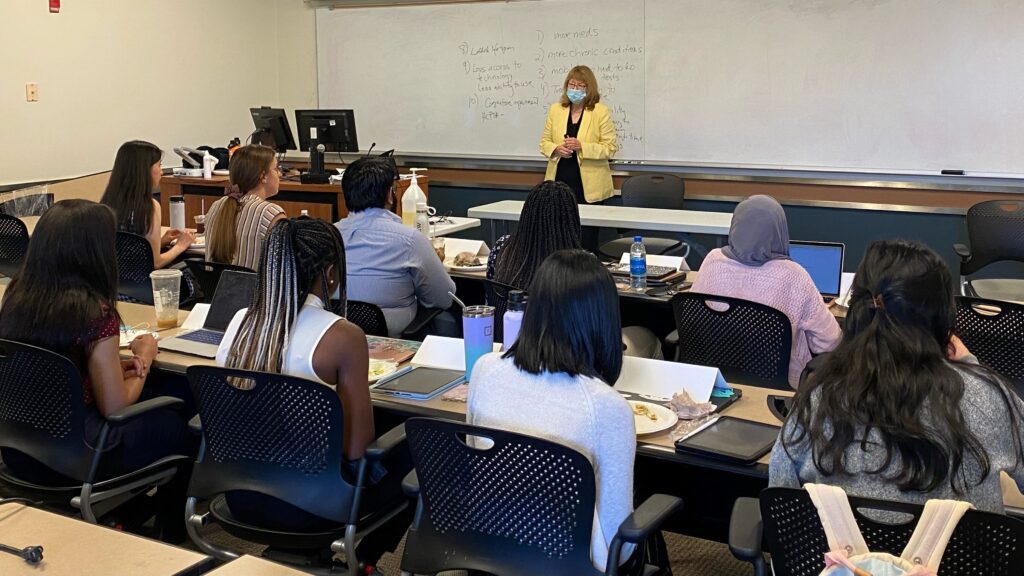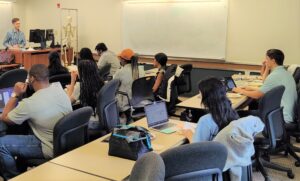
Since 2010, the UNC Medical Student Training in Aging Research (MSTAR)* Program, led by PI, Jan Busby-Whitehead, MD, has welcomed 148 medical and osteopathic students to Chapel Hill. These students all came to gain experience in aging-related research. Students are paired with an UNC faculty mentor that currently has funding in an aging-related research area.
During this 8-to-10-week summer internship program, students engage in geriatrics-focused experiences that they might not otherwise have in their normal coursework. Ellen Roberts, PhD, MPH, Co-Associate Director of the UNC MSTAR Program says, “as one of eight national MSTAR programs across the country, our MSTAR Program is a pipeline for getting medical students interesting in furthering their careers as aging related-researchers and/or as clinical practitioners in geriatrics”.
MSTAR Co-associate Director, advisor and mentor, Joshua Niznik, PharmD, PhD says, “We’re so excited to have our largest and most diverse cohort of MSTAR scholars to date. This summer we’ve welcomed 18 scholars from ten institutions across the U.S., including medical students from UNC School of Medicine-Chapel Hill. We’re also excited to be able to deliver our program in-person for the first time since 2019.”
“Our scholars have an intensive summer hands-on research experience with expert investigators in the field,” Dr. Niznik continues. “They also have weekly educational sessions focused on aging research to understand how providers across disciplines and health sciences schools care for the aging population.”
The MSTAR Experience
Gabriell Erisnor, a 2022 UNC-CH MSTAR program scholar, says, “I have enjoyed my experience as an MSTAR student and have enjoyed meeting other medical students. Also, in addition to learning about issues faced by older adults that I don’t get from my own medical school’s educational sessions, in my clinical research experience with my mentor I learned how patients appreciate a more conversational approach to the visit.”
Erisnor says that this conversation goes both ways. “A patient in the cancer clinic offered the best advice I’ve received so far: Don’t hold back on my own potential. Be myself unapologetically and be my own champion.” Erisnor also describes her experience meeting patients. “Many patients’ faces lit up after seeing a woman of color in a white coat in the same way my face lit up when I first met my [MSTAR research] mentor Dr. [Shakira] Grant. I chose MSTAR to get an education from someone who looks like me. And I’ve learned from the patients that seeing someone that looks like you in a medical environment gives people hope in this country.”
“With the continuation of our MSTAR program, the Center for Aging and Health and the Division of Geriatric Medicine at UNC-Chapel Hill continue to shine as national leaders in supporting the next generation of clinician scientists in aging research.” – MSTAR mentor Dr. Joshua Niznik

Training Future Geriatricians
After the UNC MSTAR program, some students integrate research in their medical careers and become scientists who specialize in geriatrics. For these former students, their introduction to geriatrics led them directly to careers in aging, from basic science to clinical research.
Brian Wood, a UNC medical scholar from the 2020 MSTAR cohort says, “As someone with a lot of big questions and an interest in caring for older adults, but no research experience coming into medical school, I was drawn to the MSTAR program. The teaching it provided on the research process and topics related to aging was useful for the wide variety of future career paths my fellow cohort members were interested in. MSTAR enabled me to feel confident pursuing additional research and envision making it a part of my long-term career goals.”
MSTAR Mentored Research
The UNC-CH MSTAR program has three components – Mentored Research, Education Sessions, and related Clinical Experiences. Each of these components is integral to each student’s experience.

Mentored Research
MSTAR mentoring begins before students arrive in Chapel Hill. After acceptance, students match with a mentor then work together with them to outline an individualized research plan. Once students arrive on site, they meet with their mentor weekly. Throughout the summer, the mentors offer guidance and feedback on the project. Also, mentors critique and the student’s performance on their research and as a research collaborator.
While at UNC, MSTAR scholars have the opportunity to play a vital role in research, with many of them publishing. Mentor Todd J. Cohen, PhD, (Associate Professor, UNC Department of Neurology and Director of the Cohen Lab) says, “We’re submitting a paper from our lab that features MSTAR summer program researcher Shannon Cahalan as a co-author.” He also expresses his gratitude for the MSTAR program and Shannon’s contribution. Dr. Cohen calls her, “a major asset to this paper.”
Education Sessions
MSTAR scholars also have weekly education sessions. Some of the topics covered include: challenges of including older adults in research; geriatric syndromes and their importance in research; social determinants of health; research ethics; and publishing in a medical journal.
Clinical Experiences
In addition to mentored research and education sessions, MSTAR scholars can opt for clinical experiences in and around Chapel Hill. These experiences enhance the knowledge gained through education sessions and provide greater context for the students’ research. Specifically, students may spend time at the UNC Geriatrics Clinic, UNC Hospitals Hillsborough, UNC Medical Campus, a local Continuing Care Retirement Community, or one of several other local clinical sites.
Learn More about the UNC MSTAR Program
To learn more about the program, visit the UNC MSTAR page. For specific questions about the program, please contact UNC-CH MSTAR.
*Funding for the UNC MSTAR Program is provided by NIA grant 2-T35-AG038047. Principal Investigator (PI) is Jan Busby-Whitehead, MD. Co-PI’s are Richard F. Loeser, Jr., MD and Philip D. Sloane, MD, MPH.